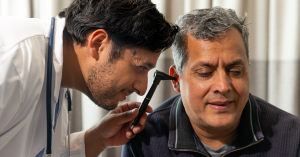In today’s digital world, convenience often guides our decisions—whether it’s shopping online, attending virtual doctor appointments, or even checking our health with at-home tools. One area that’s increasingly moving online is hearing care. Online hearing tests are now widely available, offering a quick and easy way to screen for hearing loss without leaving your home.
But as these tools grow in popularity, so do the questions about their reliability. Can an online test really assess your hearing accurately? Or are these digital screenings more of a novelty than a dependable resource?
This article explores the accuracy of online hearing tests and helps you understand when and how to use them effectively. If you or a loved one suspects hearing loss, this guide will offer clarity on whether an online test is a good starting point—and what steps to take next for your hearing health.
What Are Online Hearing Tests and How Do They Work?
Online hearing tests are digital tools designed to give users a preliminary assessment of their hearing ability. Unlike full clinical evaluations conducted by audiologists, these tests are typically free, self-guided, and accessible through websites or mobile apps. Their main goal is to screen for potential hearing issues, not to diagnose medical conditions.
There are a few common types of online hearing tests. The most widely used are pure-tone tests and speech-in-noise tests:
- Pure-tone tests ask users to listen to a series of tones at various frequencies and volumes. You indicate whether or not you can hear each tone, usually by clicking a button. The test measures the softest sounds you can detect across a range of pitches.
- Speech-in-noise tests assess how well you understand speech against background noise. These are designed to simulate real-life situations like busy restaurants or noisy gatherings, where many people with hearing loss struggle the most.
Online tests generally recommend using headphones over built-in computer speakers for more accurate results. Some even calibrate the audio based on your device, though this can vary in quality. The better the headphones and quieter your environment, the more reliable the test will be.
It’s important to understand that online hearing tests are intended as screening tools, not diagnostic exams. They can help identify whether you might have hearing loss and whether it’s worth seeking professional help. However, they cannot determine the exact type or cause of your hearing issues, nor can they provide a full audiogram or detailed hearing profile.
Used correctly, these tests can be a valuable first step—especially for individuals who are hesitant to seek in-person care or who are monitoring changes in their hearing over time. But like any health-related tool, understanding their scope and limitations is key to using them wisely.
Pros and Cons of Online Hearing Tests
Online hearing tests offer a mix of advantages and limitations, and understanding both sides is essential for deciding whether they’re right for you. These tools can be extremely helpful in the right context—but they’re not one-size-fits-all solutions.
Benefits of Online Hearing Tests
1. Convenience and Accessibility
Perhaps the biggest advantage is how easy and quick they are to use. Online hearing tests can be taken anytime, from the comfort of your home. This is especially appealing for people who live in rural areas, have mobility issues, or are simply hesitant about visiting a hearing clinic.
2. Free or Low Cost
Most online tests are free or very affordable. This lowers the barrier to entry for people who suspect hearing loss but aren’t ready to commit to a paid appointment with an audiologist.
3. Private and Discreet
Some people are uncomfortable talking about hearing loss or visiting a clinic. Online tests offer a private way to check your hearing without involving anyone else initially.
4. A Useful First Step
While not diagnostic, online hearing tests can serve as an early screening tool. They can help identify whether you might need to take further action or visit a hearing care professional.
Limitations of Online Hearing Tests
1. Environmental Variables
Noise in your home, such as traffic, appliances, or even a ticking clock, can interfere with the test results. Unlike clinical settings, you don’t have the benefit of a soundproof room, which can affect accuracy.
2. Equipment Quality
The type and quality of your headphones or speakers play a huge role in the test’s reliability. Low-quality audio equipment may distort sounds or fail to deliver certain frequencies clearly, skewing the results.
3. Lack of Professional Oversight
A licensed audiologist doesn’t administer online tests. That means there’s no opportunity for real-time adjustments or clarification if you don’t understand part of the test, and no professional interpretation of the results.
4. Limited Scope
Online hearing tests generally focus on basic tone recognition or speech comprehension. They can’t detect medical causes of hearing loss, such as earwax blockage, infections, or nerve damage. Nor can they evaluate one ear independently with precise measurements, which is often crucial in clinical diagnoses.
5. Potential for False Reassurance or Unnecessary Alarm
A false sense of security from a “pass” result might delay someone from seeking necessary help. Conversely, a false alarm might cause unnecessary worry. Either way, the consequences of misinterpreting the results could be significant.
In summary, online hearing tests are a practical, accessible entry point for assessing hearing health—but they should never replace a comprehensive, in-person exam. Used thoughtfully, they can encourage earlier action and greater awareness of hearing issues.
How Accurate Are Online Hearing Tests Compared to Clinical Audiology Tests?
Accuracy is one of the biggest concerns when it comes to online hearing tests—and for good reason. When your health is on the line, you want reliable information. So, how do these digital tools compare to a comprehensive evaluation performed by a licensed audiologist?
Understanding Clinical Audiology Testing
A clinical hearing test is conducted in a controlled environment by a trained professional. It typically includes:
- Pure-tone audiometry
- Speech recognition testing
- Tympanometry (to assess middle ear function)
- Bone conduction testing
- Detailed ear examinations
These evaluations not only measure hearing sensitivity but also help identify the type of hearing loss (conductive, sensorineural, or mixed), its severity, and possible underlying causes. The equipment used is calibrated regularly and performed in soundproof booths to ensure accurate results.
The Accuracy of Online Tests
Online hearing tests, while useful, don’t offer the same level of precision. They typically provide a screening-level assessment, identifying whether hearing loss might be present but not delivering a clinical-grade diagnosis.
Several factors affect their accuracy:
- Lack of calibration: Your device’s volume and sound settings may vary widely, which can distort test results.
- Ambient noise: Unlike soundproof clinics, your home likely has background noise that interferes with the test.
- One-size-fits-all approach: Online tests cannot adjust for individual differences, such as unilateral hearing loss (hearing loss in one ear) or specific hearing profiles.
That said, some online tests show reasonably good sensitivity—especially those backed by audiology organizations or major hearing aid companies. These tools are getting better, thanks to improved algorithms and user-friendly interfaces, but they still don’t match the depth of a clinical assessment.
What the Research Says
Research has found that while online hearing tests can be effective in identifying moderate to severe hearing loss, they often struggle to detect mild forms accurately. Some studies suggest that online tests can serve as a valuable first step in the care pathway, especially for people who might not otherwise seek help.
The Bottom Line
Online hearing tests can provide a useful initial check and raise awareness about potential hearing loss. However, their results should be viewed as a starting point—not a definitive diagnosis. If a test suggests hearing problems, or if you’re experiencing symptoms like muffled hearing, ringing in the ears, or difficulty following conversations, it’s essential to follow up with a licensed hearing care professional.
When and How to Use an Online Hearing Test Effectively
Online hearing tests can be a helpful resource—but only when used properly and with the right expectations. This section offers guidance on how to use these tools to your advantage while minimizing the risk of misinterpretation or error.
When to Use an Online Hearing Test
Online hearing tests are best used in the following situations:
- As a first step if you’re noticing early signs of hearing loss, such as needing to increase the TV volume or asking people to repeat themselves.
- For routine self-checks, especially if you’re at risk of hearing decline due to age, exposure to loud noise, or medical conditions like diabetes or cardiovascular disease.
- To monitor changes over time if you’ve already been diagnosed with hearing loss and want to track any progression between clinical visits.
- As a motivator to prompt action for those who may be hesitant to see a professional. Sometimes a test result can provide the nudge needed to seek help.
However, if you’re experiencing sudden hearing loss, ear pain, dizziness, or any other urgent symptoms, skip the online test and consult a healthcare provider immediately.
How to Prepare for the Most Accurate Results
To get the most reliable outcome from an online hearing test, follow these simple but important steps:
- Use high-quality headphones
Avoid relying on built-in laptop speakers or low-end earbuds. Over-the-ear headphones that cover both ears completely tend to provide more accurate sound delivery. - Choose a quiet environment
Find a room with minimal background noise. Even small sounds—like a humming appliance or distant traffic—can affect how well you hear test tones or speech. - Follow instructions carefully
Each test has its own format. Pay attention to the setup instructions, calibration process (if available), and how to respond to the tones or words. - Be honest and focused
Don’t guess or try to “pass” the test. The goal is to understand your true hearing ability, so approach the test with focus and honesty. - Take the test when you’re alert
Fatigue and distractions can impact your performance. Choose a time when you’re well-rested and not multitasking.
How to Interpret the Results
Most online tests will categorize your hearing as “normal,” “mild hearing loss,” “moderate,” or “severe.” Take these results as guidance, not a diagnosis. They can help determine whether further evaluation is needed, but they shouldn’t be used to select treatment plans or purchase hearing aids without a professional assessment.
Some platforms offer suggestions or resources based on your results—like a link to find a local audiologist or options to schedule a follow-up consultation. These features can be particularly useful if you’re unsure what to do next.
Used correctly, an online hearing test can be a proactive way to start taking care of your hearing health. But like any tool, it’s most effective when used within its limitations and as part of a broader approach to wellness.
What to Do If Your Online Hearing Test Suggests Hearing Loss
Seeing a less-than-ideal result on an online hearing test can be concerning—but it’s also a valuable opportunity to take action. Whether your results indicate mild or significant hearing loss, the next steps you take can make a big difference in your long-term hearing health and overall well-being.
Don’t Panic—But Don’t Ignore It Either
First, it’s important to remember that online hearing tests are screening tools, not diagnoses. Your result may be accurate, or it may be influenced by technical or environmental factors. Either way, if the test shows signs of hearing loss, it’s a signal to take the next step: seeing a hearing care professional.
Ignoring hearing loss can have serious consequences. Untreated hearing issues are linked to increased risks of cognitive decline, social isolation, depression, and even falls in older adults. The earlier you address hearing changes, the better your outcomes will be.
Schedule a Comprehensive Hearing Evaluation
Your next move should be to book an appointment with a licensed audiologist or hearing care specialist. A professional evaluation includes:
- A detailed case history and symptom discussion
- Visual inspection of the ears
- Soundproof booth testing with calibrated equipment
- Evaluation of both air and bone conduction
- Speech recognition and word comprehension testing
This comprehensive process not only confirms whether you have hearing loss, but it also identifies the type (sensorineural, conductive, or mixed) and degree (mild, moderate, severe, or profound).
Explore Your Treatment Options
If a clinical evaluation confirms hearing loss, don’t worry—there are many effective solutions available. Depending on the cause and severity, treatment options may include:
- Hearing aids – Modern devices are discreet, customizable, and increasingly affordable. Many are Bluetooth-enabled and tailored to your hearing profile.
- Assistive listening devices – For specific situations like watching TV or talking on the phone.
- Medical or surgical treatment – For certain conditions like earwax blockages, infections, or middle ear problems.
- Communication strategies and hearing therapy – Techniques to improve understanding and confidence in various listening environments.
Stay Proactive About Your Hearing Health
Even if you don’t need hearing aids right away, it’s essential to monitor your hearing regularly. Early detection and ongoing care can prevent further deterioration and improve your quality of life.
And remember—hearing loss doesn’t just affect your ears. It impacts relationships, mental health, and daily communication. Seeking help is a sign of strength, not weakness.
Conclusion
Online hearing tests have emerged as a convenient, accessible way for people to get a quick snapshot of their hearing health—especially in today’s tech-driven world. They offer a useful starting point, particularly for those who are curious, hesitant, or unsure about seeking professional help.
However, as we’ve explored, online hearing tests are not a replacement for clinical evaluations. They can flag potential issues but cannot diagnose, treat, or fully understand the complexities of hearing loss. Factors like background noise, poor-quality headphones, and uncalibrated devices can all influence results, making them less reliable than in-person testing.
The best way to use an online hearing test is as a first step—a way to raise awareness, initiate conversations, and motivate further action. If your results suggest a potential problem, the most responsible next move is to consult a qualified hearing professional. They can provide the thorough evaluation and personalized guidance that online tests simply can’t offer.
Hearing health is an essential part of overall well-being. With early intervention, effective treatments, and continued care, it’s possible to maintain your hearing—and your quality of life—for years to come. So if you’re wondering whether you should trust an online hearing test, the answer is: yes, but only as a starting point.
FAQ
What is the most accurate type of online hearing test?
The most accurate online hearing tests are those offered by reputable audiology clinics, hearing aid manufacturers, or universities. Tests that use both tone-based and speech-in-noise components tend to give a better snapshot of your hearing ability. However, even the best online tests should only be viewed as screening tools, not diagnostic exams.
Can I use an online hearing test to get hearing aids?
Some companies offer online tests followed by remote consultations and direct-to-consumer hearing aids. While convenient, this approach may skip critical steps in the diagnostic process. A face-to-face evaluation with a licensed audiologist ensures that your hearing aids are properly fitted, adjusted, and matched to your specific needs.
Are free online hearing tests reliable?
Free online hearing tests can be helpful for basic screening, but their accuracy depends heavily on how and where you take the test. Environmental noise, poor headphones, and even your browser settings can affect results. Use them as an early step, but don’t rely on them alone to make decisions about your hearing health.
What should I do if I fail an online hearing test?
If your results suggest hearing loss, make an appointment with a licensed audiologist or hearing specialist. They can perform a comprehensive evaluation to determine the exact nature and extent of your hearing issue—and recommend appropriate treatment or devices if needed.
Do online hearing tests work for all ages?
While adults can generally follow online hearing test instructions effectively, these tools may not be suitable for young children or individuals with cognitive impairments. Clinical testing in a controlled environment is always preferred for these groups.
“This article is for informational purposes only and is not a substitute for professional medical advice, diagnosis, or treatment. If you are concerned about your hearing or ear health, please consult a qualified healthcare provider.”






